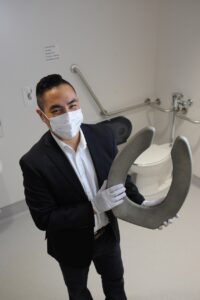Celebrating 20 Years of PICNet: Reflections from Dr. Titus Wong

The Provincial Infection Control Network of BC (PICNet) is celebrating its 20th anniversary. Since its launch in 2005, PICNet has provided provincial guidance on infection prevention and control (IPC), and advanced education and surveillance efforts across British Columbia.
Dr. Titus Wong, Provincial Medical Director, provides medical expertise to the extended infection control network in BC and advises colleagues in the Ministry of Health on guidelines and policies. He also holds leadership positions within PHSA Medical Affairs and BCCDC.
“PICNet acts as a provincial clinical interface, which is a powerful asset to have in our province,” says Dr. Wong. “It’s also a unique program within Canada – and the longest-standing provincial program of its kind.”
He emphasizes the importance of collaboration: “I continue to hold my role with PICNet because I really like the team I work with. I see how impactful their work is for health care in BC – just like we saw during the pandemic.”
Collaborating to ensure effective infection control

Dr. Wong (then with VCH) in November 2021, with one of the copper toilet seats installed in Lions Gate Hospital as part of the hospital’s disinfection program (North Shore News).
PICNet acts as a liaison, working collaboratively with health authorities. It provides provincial guidance to promote patient safety – a powerful asset to have in our province. “In two decades working in health care, the level of collaboration has never been as high as it is now, and PICNet has had a huge role in this,” he says. “This intermingling of roles and expertise can only happen with trust, which PICNet has built over the last 20 years.”
During the COVID-19 pandemic, PICNet’s prior work in Ebola planning and other diseases helped prepare the team for the challenges ahead. “In the early days of COVID-19, uncertainty was widespread,” Dr. Wong recalls. “Frontline workers needed access to the best approaches to infection control and emergency care.”
PICNet was present from the beginning, rapidly bringing together IPC leaders and bridging frontline perspectives with system-level guidance. When operating rooms were shut down, health authorities turned to PICNet for advice on restarting urgent procedures. In less than a week, provincial surgical guidelines were developed with input from all partners.
“PICNet helped ensure the confidence of colleagues in a time of fear and anxiety,” he says. “Patient care resumed quickly.”
PICNet also worked with the Ministry’s Population and Public Health team to create safe, clinically appropriate visitation scenarios during the pandemic. “Looking at the human side, all partners provided guidance from the perspective of maintaining wellness and ‘everydayness’ – a perspective that can’t be lost in the boardroom.”
Equipped for the future of infection prevention and control in BC
Looking ahead, Dr. Wong sees PICNet as well-equipped to respond to emerging threats like avian flu, monkeypox and measles. “PICNet has built a strong working relationship between IPC groups, public health and occupational health,” he says. “We can rapidly build on our multi-community programs and learn from each other.”
Find out more about PICNet’s activities through our information sheets
